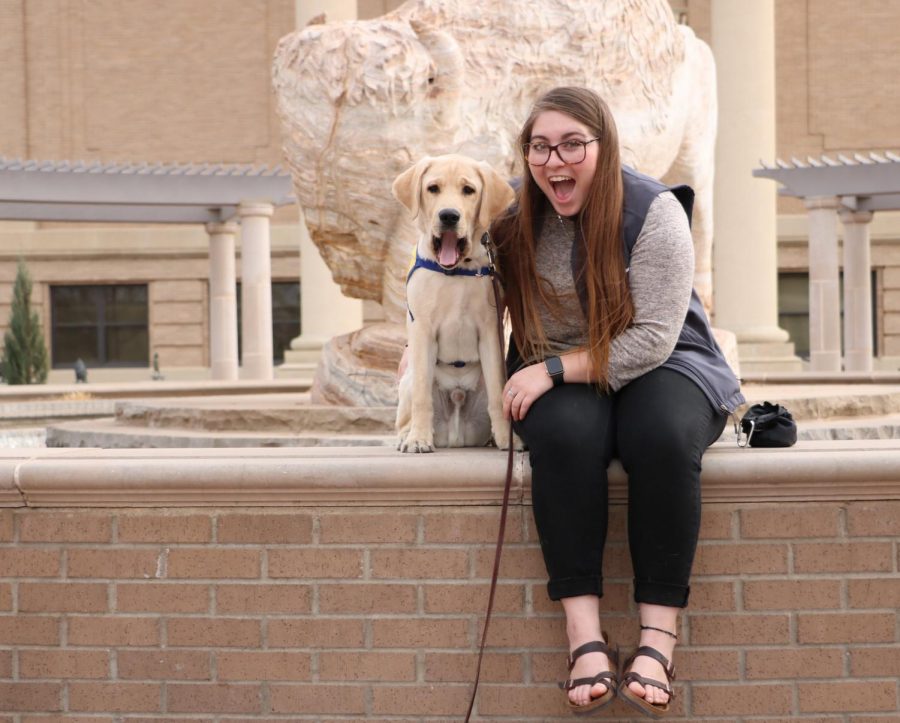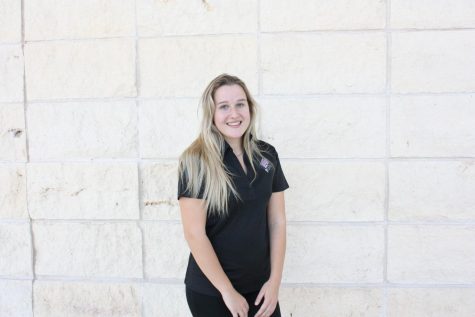Agriculture Education student raises service puppies on campus
April 5, 2018
West Texas A&M’s furriest “student” is sure to bring some smiles as he parades down the hallways.
Agricultural education major Sara Friedmann is a puppy raiser for Canine Companions for Independence, an organization that provides full-service assistance dogs free of charge for people in need. Her four-legged friend, Brendan, is being raised at WT as a part of the program.
“It’s just a way to serve [people] that is so humbling, you almost can’t put it into words,” Friedmann said.
Six-month-old Brendan is a nervous puppy who flew to West Texas from California over spring break. Since arriving, he has completed his first weeks of college accompanying Friedmann to all her classes and he is getting more secure in his new environment.
Raising a dog takes about two years and Friedmann’s family has raised six dogs in total. Her previous dog, Powers, stayed at the university for almost three semesters.
‘‘When you see them graduate with the person that they are meant to be with, it’s amazing to see,” Friedmann said.
A puppy raiser’s job is to make an eight-week-old puppy into an obedient adolescent dog ready for professional training. The goal is that the dog will eventually be an assistance animal for a person with a disability. Becca Bell, puppy program manager for Canine Companions, believes this task is rewarding but that it takes a lot of love, energy and time.
‘‘Being a volunteer puppy raiser for Canine Companions is a unique way to give back to the community and make a tremendous difference in the life of someone with a disability,’’ Bell said.
She explained that a puppy raiser is able to see the end results of their time and effort, something that makes this volunteering opportunity unique.
‘‘As a puppy raiser, you get to meet the person whose life will be changed by the puppy that you raised and see the impact that dog will make,’’ she said.
Canine Companions trains four types of assistance dogs, including hearing dogs, service dogs that help with specific tasks, skilled companions that work with a person as well as facilitator and facility dogs working in healthcare, visitation or education.
Friedmann started raising puppies for Guide Dogs for the Blind while she was a part of the National FFA Organization in high school. She chose to be a puppy raiser as her Supervised Agriculture Experience project and raised Wyatt, a dog that went on to become a guide dog. She later changed organizations and came to Canine Companions.
When Friedmann arrived at WT, she missed raising dogs and started looking into the possibilities of raising one on campus. She began by going to Paul Fenstermaker, Student Disability Services director. Fenstermaker was initially indecisive, but Friedmann stayed persistent and returned over and over again. She eventually got Fenstermaker’s approval, something he has not regretted since.
“Sara has done a tremendous job,” Fenstermaker said. “She has kind of set the example if that program grows, what that program is to look like.”
According to Fenstermaker, the policies for service animals on the WT campus is guided by the Americans with Disabilities Act. He explained that students who want to bring a service animal on campus are required to register those with the Office of Student Disability Services if the disability isn’t obvious.
“We do have students that come in and request that, and we want to be supportive of that but at the same time there needs to be accountability,” Fenstermaker said.
Requesting to have an emotional support animal requires communication with a healthcare provider and approval both from the Office of Student Disability Services as well as Residential Living.
Brendan has already made many friends on campus, and Friedmann explained that she doesn’t mind stopping and talking to people about her puppy and the organization.
“Parents say it takes a village to raise a child, I say it takes a village to raise a puppy,” Friedmann said. “You give up your time, your sleep, your energy, your home, in the beginning, stages, your carpet, but it’s worth it.”




